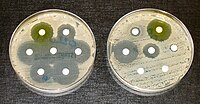
Photo from wikipedia
ABSTRACT The pathogenic yeast Candida albicans can develop resistance to the widely used antifungal agent fluconazole, which inhibits ergosterol biosynthesis. Resistance is often caused by gain-of-function mutations in the transcription… Click to show full abstract
ABSTRACT The pathogenic yeast Candida albicans can develop resistance to the widely used antifungal agent fluconazole, which inhibits ergosterol biosynthesis. Resistance is often caused by gain-of-function mutations in the transcription factors Mrr1 and Tac1, which result in constitutive overexpression of multidrug efflux pumps, and Upc2, which result in constitutive overexpression of ergosterol biosynthesis genes. However, the deregulated gene expression that is caused by hyperactive forms of these transcription factors also reduces the fitness of the cells in the absence of the drug. To investigate whether fluconazole-resistant clinical C. albicans isolates have overcome the fitness costs of drug resistance, we assessed the relative fitness of C. albicans isolates containing resistance mutations in these transcription factors in competition with matched drug-susceptible isolates from the same patients. Most of the fluconazole-resistant isolates were outcompeted by the corresponding drug-susceptible isolates when grown in rich medium without fluconazole. On the other hand, some resistant isolates with gain-of-function mutations in MRR1 did not exhibit reduced fitness under these conditions. In a mouse model of disseminated candidiasis, three out of four tested fluconazole-resistant clinical isolates did not exhibit a significant fitness defect. However, all four fluconazole-resistant isolates were outcompeted by the matched susceptible isolates in a mouse model of gastrointestinal colonization, demonstrating that the effects of drug resistance on in vivo fitness depend on the host niche. Collectively, our results indicate that the fitness costs of drug resistance in C. albicans are not easily remediated, especially when proper control of gene expression is required for successful adaptation to life within a mammalian host.
Journal Title: Antimicrobial Agents and Chemotherapy
Year Published: 2017
Link to full text (if available)
Share on Social Media: Sign Up to like & get
recommendations!